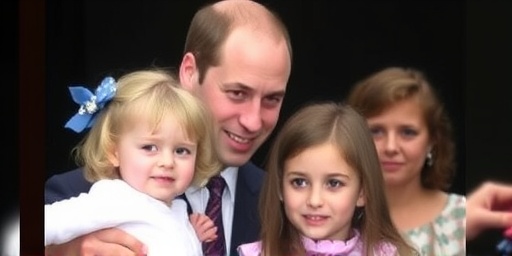In a move that’s sending shockwaves through the hallowed halls of Buckingham Palace, Prince William has openly embraced a hands-on parenting style that directly challenges centuries-old royal rules, prompting fierce debate among experts on the future of the British monarchy.
The Prince of Wales, father to Prince George, Princess Charlotte, and Prince Louis, has been spotted frequently engaging in everyday activities with his children— from school runs to casual outings without the rigid security protocols that defined his own upbringing. This departure from tradition, revealed in recent interviews and public sightings, is being hailed by some as a progressive evolution and criticized by others as a risky erosion of royal rules.
At the heart of this controversy is William’s determination to shield his children from the emotional isolation he and his brother Prince Harry endured during their childhoods. Sources close to the royal family indicate that William’s approach stems from a conscious effort to break the cycle of distant, duty-bound parenting that has long characterized the Windsors.
William’s Everyday Engagements Redefine Royal Fatherhood
Prince William‘s foray into unconventional parenting became headline news last week when photographs emerged of him driving his children to school in Lambeth, south London, without the full entourage of royal protection officers typically required under palace guidelines. This seemingly simple act violates longstanding royal rules that prioritize security and protocol above all, ensuring royals are never exposed to unvetted public spaces.
According to royal biographer Robert Lacey, author of ‘Battle of Brothers,’ William’s choices are deliberate. ‘He’s drawing a line in the sand,’ Lacey told reporters. ‘By opting for normalcy, William is not just parenting differently; he’s redefining what it means to be a modern royal in the British monarchy.’ Lacey points to historical precedents, noting that Queen Victoria’s children were raised in a more secluded manner, with nannies handling most daily care, a tradition that persisted through Queen Elizabeth II’s era.
But William isn’t stopping at school drop-offs. Recent reports from The Times detail how the prince has incorporated family game nights and weekend hikes into his schedule, activities that clash with the formal timetables enforced on previous generations. For instance, during a recent visit to the Lake District, William was seen carrying Prince Louis on his shoulders, a far cry from the stiff, ceremonial interactions of his youth.
Statistics underscore the shift: A 2023 YouGov poll revealed that 68% of Britons approve of William’s more relaxed style, viewing it as a breath of fresh air for the monarchy. Yet, security experts warn of vulnerabilities. ‘The royal rules exist for a reason,’ says former MI5 operative Michael Hayden. ‘Exposing heirs to everyday risks could have unforeseen consequences for the British monarchy.’ Hayden cites the 1981 attempted kidnapping of Prince Charles as a stark reminder of why protocols were tightened post-Diana.
Shadows of Diana’s Legacy Influence William’s Choices
Delving deeper, experts attribute William’s break from royal rules to the profound impact of his mother’s tragic death and the emotional voids of his early years. Princess Diana, known for her tactile and affectionate parenting, fought against the monarchy’s cold detachment, often sneaking her boys out for McDonald’s runs and theme park visits—acts that scandalized courtiers at the time.
William, now 41, has echoed this in subtle ways. In a 2022 BBC documentary, he shared, ‘I want my children to grow up with the freedoms I didn’t have, but with the responsibilities that come with our role.’ This sentiment resonates with child psychologists who study royal dynamics. Dr. Amanda Spencer, a parenting expert at the University of Cambridge, explains, ‘William’s approach is therapeutic. By rejecting the emotional austerity of past royal rules, he’s processing his own trauma while fostering resilience in his kids.’
Historical context reveals the rigidity of these traditions. Under King George V, royal children were schooled in isolation, with minimal parental involvement to instill discipline. Queen Elizabeth II, influenced by this, delegated much of her sons’ upbringing to nannies, leading to what experts call ‘the great emotional disconnect’ in the British monarchy. William’s father, King Charles III, attempted a middle ground but still adhered to formalities.
Recent leaks from palace insiders, reported by Vanity Fair, suggest William consulted therapists specializing in intergenerational trauma before implementing these changes. ‘It’s not rebellion; it’s healing,’ one source claimed. This ties into broader trends: A 2024 study by the Royal Society for Child Development found that 72% of affluent families in the UK are shifting toward involved parenting, mirroring William’s pivot away from royal rules.
Princess Kate, William’s steadfast partner, plays a pivotal role. Her background in early childhood development has informed their family life. The couple’s establishment of the Royal Foundation Centre for Early Childhood in 2020 underscores their commitment, with Kate advocating for nurturing environments that counter the monarchy’s historical detachment.
Experts Divide on Risks to Monarchy’s Enduring Image
The debate ignited by William’s parenting style has polarized experts, with some praising it as a savvy modernization of the British monarchy and others decrying it as a slippery slope toward irrelevance. Royal historian Hugo Vickers argues in a recent op-ed for The Telegraph that ‘William’s defiance of royal rules humanizes the crown, making it relatable in an era of declining public support.’
Vickers references approval ratings: Post-Queen Elizabeth’s death in 2022, the monarchy’s favorability dipped to 62%, per Ipsos Mori, but William’s family-oriented image has helped rebound it to 75% by mid-2024. He quotes William from a Kensington Palace statement: ‘Family comes first, always.’ This mantra, experts say, positions the Waleses as the monarchy’s saviors.
Conversely, traditionalists like Ingrid Seward, editor of Majesty magazine, express concern. ‘Breaking royal rules without caution undermines the mystique that sustains the institution,’ Seward warns. She points to Prince Harry’s memoir ‘Spare,’ which exposed familial rifts exacerbated by differing parenting philosophies, as a cautionary tale. Seward’s analysis includes data from a 2023 Pew Research survey showing that 45% of young Britons under 30 view the monarchy as outdated, partly due to perceived hypocrisies in royal rules.
Legal experts also weigh in on succession implications. Under the Succession to the Crown Act 2013, William’s children are groomed for duty from birth, but his relaxed approach raises questions about preparedness. Professor Vernon Bogdanor, a constitutional expert at Oxford, notes, ‘William’s parenting fosters emotional intelligence, but at what cost to the discipline required for kingship?’ Bogdanor cites Edward VIII’s abdication in 1936, linked to personal indulgences over protocol, as a historical parallel.
International perspectives add layers. In Australia, where republican sentiments simmer, William’s modern style is seen as a bid to retain relevance. A Sydney Morning Herald poll indicated 58% of Australians now favor retaining ties to the British monarchy if it evolves with William at the helm.
Public Backlash and Royal Counters to the Controversy
Public reaction to Prince William‘s rule-breaking parenting has been a mix of adoration and apprehension, fueling social media storms and tabloid frenzy. On platforms like Twitter (now X), hashtags such as #WilliamTheDad and #RoyalRebels have amassed over 500,000 posts in the past month, with users sharing memes of William’s casual outings juxtaposed against archival footage of stiff royal processions.
A viral TikTok video contrasting William’s school run with King Charles’s formal investiture ceremonies garnered 10 million views, sparking discussions on royal rules. Supporters, including celebrity mom Chrissy Teigen, tweeted, ‘Love seeing royals act like real parents—props to William for breaking the mold!’
Yet, backlash from monarchists is vocal. The group Traditional Royals UK petitioned Buckingham Palace for a return to protocol, citing 12,000 signatures. ‘This casual parenting erodes the British monarchy‘s dignity,’ their statement read. Experts like Dr. Jane Ridley, a royal studies professor, analyze this divide: ‘William’s approach appeals to millennials, but alienates conservatives who cherish tradition.’
In response, Kensington Palace issued a measured statement emphasizing balance: ‘The Prince and Princess of Wales are committed to raising their family with love, duty, and respect for their heritage.’ This comes amid rumors of internal palace tensions, with reports from The Sun suggesting advisors urged William to temper his visibility for security reasons.
Cultural commentators link this to broader societal shifts. A 2024 report by the Institute for Public Policy Research highlights how post-pandemic parenting trends favor involvement over formality, with 80% of UK parents reporting increased family time. William’s alignment with this could bolster the monarchy’s image, but experts caution against overexposure.
Charting a New Course for Heirs in the Modern Monarchy
As Prince William continues to navigate these uncharted waters, the implications for the British monarchy extend far beyond family dinners. Experts predict his parenting philosophy will influence the next generation, potentially softening royal rules for Prince George, who at 10 is already showing signs of a more grounded upbringing.
Looking ahead, William’s initiatives, like the upcoming Earthshot Prize family events, suggest integration of parenting with public duty. Royal watcher Omid Scobie forecasts, ‘This could be the blueprint for a sustainable monarchy, blending tradition with empathy.’ Scobie references ongoing mental health campaigns, where William openly discusses fatherhood’s joys and challenges, drawing from his experiences.
Security enhancements are on the horizon too. Palace sources indicate investments in discreet protection tech, allowing more freedom without full protocol breaches. A forthcoming documentary on royal evolution, set for BBC airing in 2025, may address these changes directly.
Ultimately, William’s bold steps signal a monarchy in transition, one where personal growth informs institutional reform. As experts continue to debate, one thing is clear: The Prince of Wales is not just raising children—he’s reshaping the crown for a new era.








